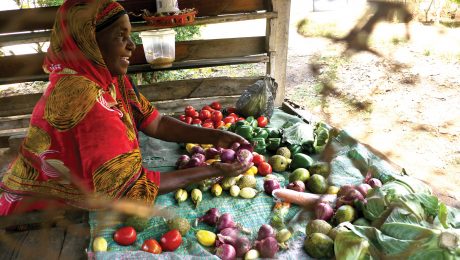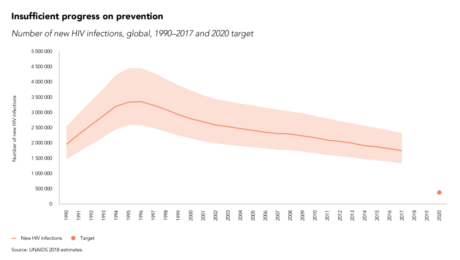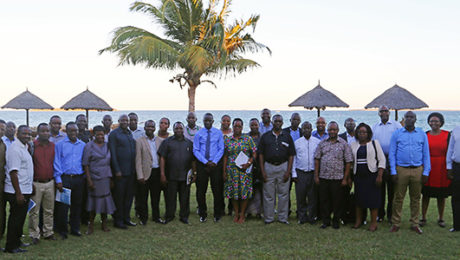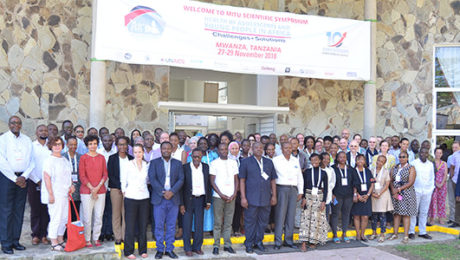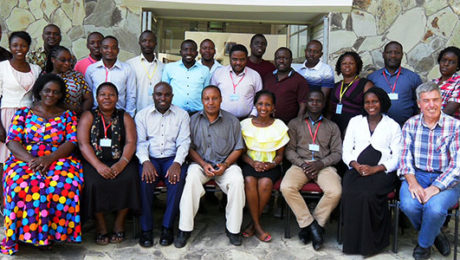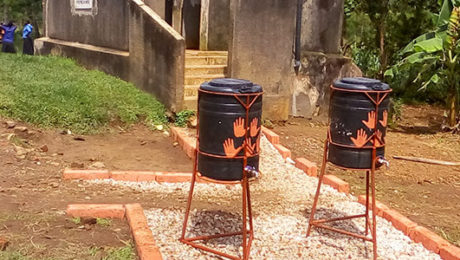By: Sheila Harvey, Associate Professor in Clinical and Social Intervention Trials at LSHTM, and Saidi Kapiga, Professor of Epidemiology and International Health at LSHTM
The impact of violence against women is considerable. Women often have low self-esteem and low self-confidence. They feel inferior to others in their community, including their own children, who witness them being beaten by their partner. Other women feel angry and have vented their anger on their children.
But talking about violence has given women hope that things can change.

Globally, around a third of women have experienced physical and/or sexual violence from an intimate partner. There are many negative impacts for women and their families, including poor physical health, mental health problems, such as depression, post-traumatic distress, suicide, and alcohol and drug abuse.
Furthermore, there is accumulating evidence of an association between intimate partner violence and women’s risk of becoming infected with HIV infection. Studies have highlighted poverty as one of the key drivers of vulnerability to intimate partner violence and HIV infection. This has led to economic interventions, such as microfinancing, being employed as a central approach to addressing these overlapping epidemics with the aim of strengthening women economically and improving household welfare.
There is also increasing recognition of its impact on health. Women’s increased participation in decision-making is associated with positive impacts on population and child health.
It has been suggested that microfinance can reduce intimate partner violence by empowering women economically, which in turn, leads to greater self-esteem and self-confidence, wider social networks, and household decision-making power.
However, the impact of microfinance on violence against women has produced mixed results. It may also increase intimate partner violence by challenging established gender norms and male authority.
A recent evaluation of economic interventions found that positive outcomes were more likely when economic strengthening was combined with gender empowerment interventions.
In one of the earliest trials implemented in South Africa, microfinance loans were provided to women in groups in combination with a 10-session participatory gender and HIV awareness intervention. Two years after delivery of the intervention, women’s reported experience of past-year physical and/or sexual intimate partner violence was reduced by 55%.
This influential trial also raised a number of questions, including whether the impact was due to the microfinance loans or to the 10-session gender awareness component, or both. Another important question for policymakers was whether a similar impact could be achieved in other settings with high rates of violence.
This is something we wanted to find out in the recent MAISHA study.
Delivered to women who are members of an established microfinance loan scheme in Mwanza city, Tanzania, MAISHA involved a ten-session participatory curriculum that covered a range of gender issues and aimed to: empower women, prevent their experience of intimate partner violence, and to promote healthy intimate relationships.
Interviews before the intervention revealed women in Mwanza experience high rates of physical and/or sexual violence. They also experience other forms of abuse such as controlling behavior by a partner, and emotional and economic abuse.
Our intervention reduced the risk of physical and/or sexual intimate partner violence by a quarter over a two-year period. The effect was strongest for physical violence, which was reduced by one-third, while the impact on sexual violence was limited.
The impact was greater among women who participated in seven or more of the ten sessions. Attitudes towards violence and norms around male authority shifted among women who received the intervention. In-depth interviews with a small sub-set of the women who participated in the intervention revealed increased self-confidence because of new skills in communication and conflict resolution.
However, it is not clear whether a similar reduction in violence would be observed if the MAISHA intervention was delivered to women who are not engaged in established group-based microfinance activities. It is possible that combining the intervention with a scheme that aims to empower women economically was necessary to produce the effect on violence we observed. This would support findings from other studies.
To understand whether the MAISHA intervention could have the same effect among women not engaged in a microfinance loan scheme, a second trial has recently been completed in Mwanza city.
The UN’s sustainable development goal 5 is to eliminate all forms of violence and abuse against women and girls, and the MAISHA study adds to the growing evidence that violence can be prevented by combining strategies to improve women’s economic and social situation.
Further work is required but the MAISHA intervention has the potential to positively impact the lives of a large number of women, not just in Tanzania but also in other similar settings with high rates of gender-based violence across the globe.
Publication
S. Kapiga, S. Harvey, G. Mshana, C.H. Hansen, G.J. Mtolela, F. Madaha, R. Hasim, I. Kapinga, N. Mosha, T. Ambramsky, S. Lees, C. Watts. A social empowerment intervention to prevent intimate partner violence against women in a microfinance scheme in Tanzania: findings from the MAISHA cluster randomized controlled trial. The Lancet. DOI:10.1016/S2214-109X(19)30316-X
On 16 September 2019, MITU published results from a large cluster-randomised controlled trial (called MAISHA study) evaluating a social empowerment intervention to prevent intimate partner violence against women. MITU investigators conducted the trial in Mwanza city, NW Tanzania. Women involved in a microfinance loan scheme (provided by BRAC) took part in a participatory gender awareness curriculum, which aims to empower women, prevent intimate partner violence, and promote healthy relationships. The curriculum was developed by EngenderHealth, an international non-profit organisation focussing on gender equity and reproductive health.
The investigators found that after 24 months, women in the intervention arm were less likely than those in the control arm (who did not receive the intervention) to report past-year physical or sexual intimate partner violence. The effect was greater for past-year physical IPV, which was reduced by a third. However, evidence of an impact on past-year sexual IPV was limited. Women in the intervention arm were also much less likely to express attitudes accepting of intimate partner violence, or express attitudes accepting of intimate partner violence, or to view intimate partner violence as a private matter.


Intimate partner violence is a major problem in Tanzania, and many other countries in sub-Saharan Africa. The Tanzanian government is committed to addressing this problem through its national plan of action to end violence against women. This trial, which was conducted in collaboration with the Tanzania National Institute for Medical Research and the London School of Hygiene & Tropical Medicine, addressed the UN’s sustainable development goal 5 to eliminate all forms of violence and abuse against women and girls.
The trial findings add to evidence from other studies showing that a social empowerment intervention combined with economic empowerment can be effective in reducing women’s experience of intimate partner violence. The MAISHA investigators have recently completed a second, linked trial evaluating the impact of the MAISHA intervention delivered to women in newly-formed groups who are not engaged in a formal microfinance loan scheme.
“The results of MAISHA suggest that the addition of a social empowerment intervention to existing microfinance programmes can lead to considerable reductions in women’s experiences of physical intimate partner violence over and above those that may result from microfinance alone” said Prof Saidi Kapiga, co-principal investigator of MAISHA study.
“The MAISHA trial adds to a growing body of evidence that violence against women is preventable. Interventions such as MAISHA have the potential to positively affect the lives of a large number of women in Tanzania, and other settings where intimate partner violence is common” said Dr Sheila Harvey, co-investigator of MAISHA study.
For more information, you can read the published article online in the Lancet Global Health. Here are the links to the paper and the accompanying editorial.
https://www.thelancet.com/journals/langlo/article/PIIS2214-109X(19)30316-X/fulltext
https://www.thelancet.com/journals/langlo/article/PIIS2214-109X(19)30372-9/fulltext
“The community is not on the girls’ side”
Rise clubs are helping adolescent girls and young women start conversations about HIV and sexual and reproductive health and rights.
Khayelitsha is one of South Africa’s largest townships, situated in the Cape Flats in Cape Town, South Africa.
As is the case in many other communities in South Africa, women and girls in the semi-informal settlement deal with gender inequality on a daily basis, which puts them at higher risk of HIV infection.
Gender inequality is a barrier for adolescent girls and young women to access HIV and sexual and reproductive health services and comprehensive sexuality education. It also places girls at higher risk of gender-based violence.

Momentum for Universal Health Coverage (UHC) in Africa is building and many African countries have already integrated UHC into their national health strategies. But with 11 million Africans pushed into extreme poverty each year because of out-of-pocket health expenses, how can Africa achieve UHC which delivers a quality package of care for people living in Africa?
The UHC debate was buzzing in Rwanda’s capital Kigali this week during one of the largest health gatherings in Africa, the Africa Health Agenda International conference 2019. Co-hosted by the Ministry of Health of Rwanda and the African Medical and Research Foundation (Amref Health Africa), 1500 health leaders shared new ideas and home-grown solutions to the continent’s most pressing health challenges.
Participants discussed the need for countries to embrace the concept of UHC and do their utmost to make it work. They stressed that good health allows children to learn and adults to contribute to societies and the economy. They also underscored that it can allow people to emerge from poverty and provides the basis for long-term economic security, essential for the future of the continent.
Host country President, Paul Kagame was awarded the honour of excellence in recognition of his political leadership on UHC. In a tweet he thanked Amref saying, “We owe this progress to partners like you who have joined forces with us in our journey to deliver a dignified and healthy life for all Rwandans.” The Minister of Health of Ethiopia also received an award for Ethiopia’s work in promoting primary health care.
Ensuring that everyone has access to basic health services is a challenge and the key to the success of UHC will be ensuring that the quality of services is good enough to improve the health of the people who access them.
“We need to track the impact of UHC,” said Michel Sidibé, co-moderating a high-level ministerial panel. “Coverage is not enough, we need to be delivering quality, affordable, accessible services to all. The ultimate measure of success for UHC will be whether the poorest, the marginalized and the most vulnerable people are able to benefit.”
During the conference Mr Sidibé participated in a townhall with young people. He spoke to them about their meaningful engagement in the UHC process saying that young people need to ‘claim and own the space.’ He also talked to civil society groups about the remarkable progress towards achieving the UNAIDS 90-90-90 treatment targets across Africa and of the critical need of their continued engagement on HIV within UHC.
The first ever United Nations High-Level Meeting on Universal Health Coverage will take place on 23 September 2019 during the United Nations General Assembly under the theme ‘Universal Health Coverage: Moving Together to Build a Healthier World.’
The number of new HIV infections globally continues to fall. Modelled estimates show that new infections (all ages) declined from a peak of 3.4 million [2.6 million–4.4 million] in 1996 to 1.8 million [1.4 million–2.4 million] in 2017—the year for which the most recent data are available. However, progress is far slower than that required to reach the 2020 target of fewer than 500 000 new HIV infections (see graph below).

MITU organized a special meeting for stakeholders of Water, Sanitation and Hygiene (WASH) sector in Tanzania. This meeting, held on the 7th December 2018 at the White Sands hotel in Dar es Salaam, was a collaborative effort of MITU, the National Institute for Medical Research (NIMR) Mwanza research centre, WaterAid, and the London School of Hygiene and Tropical Medicine. MITU was holding this meeting for a third year in a roll as part of the Sanitation and Hygiene Applied Research for Equity (SHARE) consortium activities in Tanzania.
The meeting was attended by WASH research scientists, policy makers and programme implementers from Tanzania (42) and from other African countries, including Malawi (2) and Zambia (1). The main objective of this meeting was to highlight SHARE consortium research activities implemented by MITU and WaterAid in Tanzania and work done by SHARE partners – Malawi Epidemiology and Intervention Research Unit (MEIRU) in Malawi and Centre for Infectious Disease Research in Zambia (CIDRZ). The secondary objective was to bring together key stakeholders in WASH and provide opportunity for sharing information and networking.
During the meeting, Drs Kenneth Makata, Safari Kinung’hi and Elialilia Okello presented preliminary results from the ongoing Mikono Safi study, which means “clean hands” in Kiswahili, a cluster-randomised trial aiming to assess the effectiveness of a behaviour intervention, including promotion of handwashing with water and soap, among school-aged children in the Kagera Region of North-Western Tanzania in reducing the prevalence and intensity of Ascaris lumbricoides and Trichuris trichiura infections. The trial is implemented in 16 primary schools located in 3 districts (Bukoba municipality, Bukoba and Muleba) among the 7 districts of Kagera region.
Overall, this was a highly successful and well-organised event with plenty of time for formal presentations and informal discussions. At the end, participants agreed to continue holding the meeting each year beyond the period covered by SHARE consortium which ends in December 2018.
MITU recently organized a highly successful scientific symposium with the theme “Health of Adolescents and Young People in sub-Saharan Africa: Challenges and Solutions”. The symposium was held on 27-29 November 2018 in Mwanza city, NW Tanzania. The symposium was part of the celebrations to mark the 10th anniversary of MITU, one of the main LSHTM research partnerships in Africa, and a product of a long-standing research collaboration with the Tanzanian National Institute for Medical Research (NIMR).
The symposium was attended by scientists from Tanzania (58), other African countries (36), Europe (23) and the United States (1). Participants included strong representation from other LSHTM-related partnerships in Africa, including the MRC/UVRI & LSHTM Uganda Research Unit in Uganda, Malawi Epidemiology and Intervention Research Unit (MEIRU) in Malawi, and Biomedical Research and Training Institute (BRTI) in Zimbabwe, Zambia AIDS Related Tuberculosis (ZAMBART) Project in Zambia, and other key collaborators from South Africa, Kenya and Ghana.
During the symposium, there were keynote presentations reviewing key areas of the health of adolescents and young people (AYP) in Africa, as well as shorter talks and discussion of research gaps, future directions and methodological approaches. Important areas of AYP health addressed included HIV and sexual health; mental health; non-communicable diseases; cognitive development and risk taking; and development and evaluation of interventions. The presentations also showcased research conducted by MITU on adolescent health. This included a special poster session which was well attended by participants during the first two days of the meeting. A special journal supplement showcasing major presentations during the symposium will be published.
We look forward to continuing growth in our research and impact during the next ten years!

The Mwanza research methods course is an annual event co-organised by MITU and the National Institute for Medical Research (NIMR) Mwanza Centre. This training opportunity continues to be popular among early career researchers in the East African region.
The course was designed to cater for the needs of researchers in the early stages of their careers. It complements what is offered in formal training institutions (such as universities) by focussing on both theoretical and practical training covering all key stages in research process.
Course graduates have utilised the knowledge in different ways – some to complement their post graduate training at Masters, PhD and post-doctoral levels.
Since its inception in 2011, the course has been delivered consistently with the same high quality. The course tutors are expert researchers at MITU/NIMR and the London School of Hygiene & Tropical Medicine who ensure quality theoretical teaching and practical sessions to solve problems that the participants present from their own projects.
The costs for attending the course has also been kept down in order to give an opportunity to as many participants as possible to attend the course from different countries in the East African region and beyond.
Table showing the number of participants in the course since its inception in 2011
| Year | Dates | Number of participants | Countries represented |
| 2011 | 7-25 February |
33
|
Tanzania (26), Kenya (2) and Uganda (5) |
| 2012 | 19-30 March |
26
|
Tanzania (24), Nigeria (1) and Zambia (1) |
| 2013 | 11-22 March |
12
|
Tanzania (11) and Japan (1) |
| 2014 | 17-28 February |
17
|
Tanzania (17) |
| 2015 | 2-13 March |
17
|
Tanzania (15) and Rwanda (1) |
| 2016 | 7-18 March |
17
|
Tanzania (16) and USA (1) |
| 2017 | 27 February-10 March |
41
|
Tanzania (28), Uganda (9), Kenya (1), Malawi (1), Zambia (1) and Ethiopia (1) |
| 2018 | 26 February-9 March |
21
|
Tanzania (15) and Uganda (6) |
This year the course was ran from the 26th of February to the 9th of March 2018 and was attended by 21 participants from Tanzania and Uganda. Demand for the course is increasing as evidenced by increasing number of applications received. Because of this, MITU/NIMR are considering running it twice a year. Discussions are also underway with some academic institutions in the region and UK to explore the possibility of accrediting the course as a module within their curricular.



Chronic diarrhoea and helminthic infections, especially soil transmitted helminths (STH), are frequent infections in childhood, and are strongly associated with malnutrition, and poor child and cognitive development. Common STH infections – ascariasis and trichuriasis – are picked up when people ingest Ascaris lumbricoides and Trichuris trichiura eggs after they have matured in the environment by eating raw, unwashed vegetables or by not washing their hands after handling contaminated soil.
The burden of STH is very high in Kagera region in northwestern (NW) Tanzania, with more than 50% of school children infected with at least one worm in most schools in this region. As part of the national deworming programme, the government provides drugs once every year to all primary school pupils in Kagera and other regions where this is a problem. Whilst deworming campaigns offer a cost-effective method for the reduction of the STH burden, children become quickly reinfected. An integrated approach that combines sustainable hygiene behaviour change with deworming could prove a more effective way to control STH infections.
To address this problem, MITU is conducting a Mikono Safi(which means clean hands in Kiswahili) trial to assess the effectiveness of a behaviour intervention, including promotion of handwashing with soap (HWWS), among school-aged children in the Kagera region of NW Tanzania in reducing both the prevalence and intensity of Ascaris lumbricoides and Trichuris trichiura infections. This is part of the DFID funded consortium “Sanitation and Hygiene Applied Research for Equity” (SHARE) (www.shareresearch.org).
The trial is implemented in two main stages. The first stage was conducted between September 2016 and April 2017. During this stage, formative research was conducted in three schools in Bukoba Municipality to develop and pilot a comprehensive hand hygiene intervention for use in schools and communities. Findings from this stage were used to finalise the design of the intervention package and other details of the trial.
The second stage of the trial started in August 2017 with the selection of 16 schools to be included in the trial from Bukoba municipality, Bukoba rural district and Muleba district. The schools were randomised to the intervention (8) or control (8) arm during a meeting attended by head teachers and other officials. The implementation of the intervention started in November 2017. The intervention package includes installation of handwashing facilities and other environmental modifications; engagement with parents to promote the intervention at home; teachers training and delivery of classroom sessions; educational materials to promote handwashing at school; and enhanced organisational support at schools.
The primary outcome of interest will be the prevalence of infection with ascaris and trichuris following deworming in both the intervention and control schools. Secondary outcomes will include: self-reported hand-washing behaviour (both at home and in schools), the prevalence of worm eggs retrieved from hands in a subgroup of pupils, and the prevalence of hookworm infection.
For more information about this trial and SHARE Consortium activities in Tanzania please contact Mr Amani Beda at amani.beda@mitu.or.tz or Tel # +255 282 500019.


